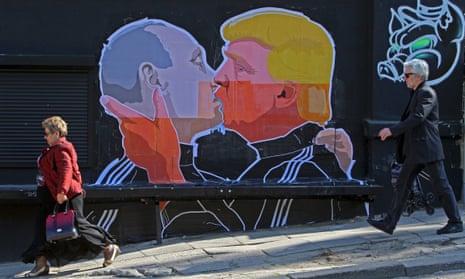Allegations that the Kremlin is responsible for the damaging hack of Democratic National Committee emails may never be conclusively proven, but there is plenty of evidence suggesting that Donald Trump’s presidential bid can count on at least some backing from Moscow.
That support is sometimes more than tacit: in December, months before Trump secured the Republican nomination, Putin called him “a colorful person, talented, without any doubt” and said: “It’s not our business to decide his merits, that’s for US voters, but he is absolutely the leader in the presidential race.” The Russian president later appeared to qualify his remark.
In turn, Trump has described Vladimir Putin approvingly as a “strong leader” with whom he would have “a very good relationship”.
Last week, Aleksey Pushkov, the head of the Duma’s foreign affairs committee, tweeted: “Clinton’s credo is to strengthen US alliances against Russia; Trump’s credo is only to respond to real threats. Aggressive banality versus common sense.”
Russian state media has largely been favourable to Trump, who has historically relied on Russian money for financing his property deals – a fact admitted by one of his sons, Donald Jr. Furthermore, the Republican candidate has two men in his immediate circle with a record of promoting Russian causes.
Paul Manafort, the campaign chair formerly worked as an adviser to Viktor Yanukovych, former Ukrainian president and a Vladimir Putin ally ousted in a revolution two years who is now living in exile in Russia. And Carter Page, a Trump foreign policy adviser with a long history of financial ties to the Russian energy giant Gazprom.
Meanwhile, some of Trump’s most striking policy pronouncements were very much in Russian interests, most spectacularly his questioning of Nato’s basic tenet, that an attack on one member state would be treated as an attack on all, and his campaign’s determination to strip language on supporting Ukraine against Russian intervention from the Republican manifesto.
The Clinton camp has cried foul, with the campaign manager, Robby Mook, arguing on the ABC current affairs programme This Week that the Russians had leaked the DNC emails to help Trump, suggesting that the nominee’s policy positions gave Moscow ample incentive.
“It was concerning last week that Donald Trump changed the Republican platform to become what some experts would regard as pro-Russian,” Mook said.
There seems little doubt that there is a stiff wind from the east at Trump’s back. The difficult question is to what extent there is an orchestrated, clandestine Kremlin plot to get him elected, whether Trump is, in effect, the Siberian Candidate.
Without the publication of his tax returns, it is hard to say how much of Trump’s self-funded campaign draws on Russian capital, and where exactly that money comes from. If the Kremlin’s hand in the DNC email hack and leak is confirmed, however, that would represent concrete evidence not just of espionage but an active attempt to influence the political process of another country.
Moscow has a long track record of backing rightwing mavericks in Europe from Marine Le Pen in France to Italy’s Silvio Berlusconi. State media promoted the UK’s Brexit campaign and Russian money has gone to the far right in Greece and Hungary. But the European experience also shows Russian intervention as sporadic and opportunistic, intended to prod and poke at the continent’s unity, rather than an organised conspiracy. That pattern now appears to have been duplicated in the race for the biggest political prize of all, the US presidency.

Comments (…)
Sign in or create your Guardian account to join the discussion